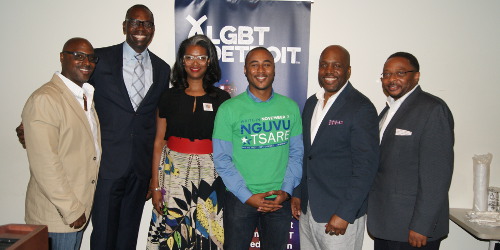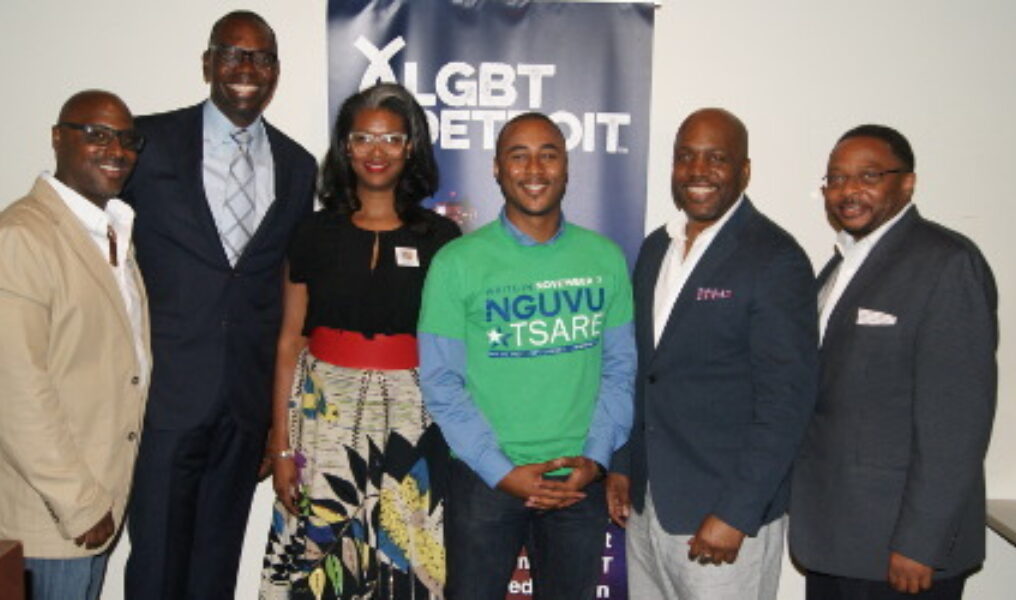
Phillips Simmons, Garlin Gilchrist II, Ingrid LaFleur, Nguvu Tsare, Curtis Lipscomb and Dr. Truman Hudson, Jr. Photo courtesy of Ray O'Shay
LGBT Detroit and the Center for Disparity Solutions and Equity at the University of Michigan Dearborn hosted this year's annual gathering of LGBTQ issues on July 28 at the UM Detroit Center.
The event, "Defeating Apathy: A Movement Towards Equitable Solutions in Detroit," coincided with Hotter Than July, a week-long social justice and equality celebration that combines cultural, spiritual and educational components in its programming.
The event was facilitated by Alfredo D. Smith, Linkage to Care Supervisor with UNIFIED – HIV Health & Beyond and David A. Nelson, Jr., who offers early intervention services and care coordination with Health Emergency Lifeline Programs.
Keynote speaker Dr. Truman Hudson, Jr., Director of Industry and Community Partnerships, Center for Disparity Solutions and Equity, UM Dearborn, focused the discussion around apathy.
"When you look at this term around equity, people who are apathetic influence the vote," he said, pointing to Robert's Rules of Order. "If you abstain from the vote, you agree with the affirmative. If you don't vote no, if you don't vote yes, you voted."
Hudson, Jr. makes some valid points as citizens in Detroit are getting ready to vote in the primary on Aug. 8 when the mayor, all nine city council seats, and the city clerk are up for election.
"If you are affirmative, you get what you want. If you are apathetic and not engaged, you're giving them what they want. So, if you don't get what you want, it's because you haven't exercised your voice," he said. "Make your voice count. If we're not active, it's on us. If we don't have what we want, it's on us."
Following Hudson, Jr. was a mayoral candidate forum organized by Ricky L. Jones, a volunteer with LGBT Detroit. This was an opportunity for candidates to speak directly to the LGBTQ community in Detroit.
"Just because they answer these questions doesn't mean it's going to happen once they get in office," said Hudson, Jr. "We have to hold the people we're voting for accountable when they tell us they're going to give us what we want. We have to engage our politicians and make sure they hear our voices."
There to share their campaign promises were Senator Coleman A. Young II (D-Detroit), Ingrid LaFleur, Garlin Gilchrist II, Nguvu Tsare and Brenda Jones. The forum was moderated by Phillips Simmons, founder and executive director of Pure Recovery, Inc.
Dr. Truman Hudson, Jr. with Brenda Jones and Curtis Lipscomb. Photos courtesy of Ray O'Shay
Where Candidates Stand
LaFleur, a write-in mayoral candidate, spoke about what she wants to accomplish in the city of Detroit. She believes in a new economy and a new government like the community has never seen before.
"The institutions, the systems that we are working within are literally created on the foundation of oppression and white supremacy and their patriarchy. It was never meant for me. It was never meant for you. It was never meant for us, right? So it's a state of emergency," she said to a room full of mostly African American men. "This is real. This is about more than survival. I want us to be living in Detroit. I'm tired of us struggling and being distracted with water shutoffs and people losing their homes and can't even afford to repair homes that are aging and over 100 years old – they're beautiful – but they're aging, so what can we do?"
When discussing the various ways to move forward, LaFleur said she's been investigating the possibilities, like cryptocurrency, decentralizing government, a digital society, and investing in the cannabis industry, which will be a $50 billion industry in 2021.
"By bringing hemp to us, we can grow our manufacturing. That means we can create hempcrete that can repair our infrastructure that seems to crumble every single winter," she said calling out the racial disparity that already exists when out of 100 cannabis dispensaries that are open, only one percent are Black owned.
LaFleur envisions a creative economy, like Berlin's, that makes $900 million a year off of techno music.
"We don't even have a cultural affairs department," she said. "We have not valued the culture and the skills and the talent of our people. We have a 64 percent poverty rate. This is ridiculous. That includes the working poor, which breaks my heart. You are working and you still can't pay your bills. You're still struggling. Enough of that. We need to be investing. We need to be looking at new ways to make sure that our people – Detroiters, Black Americans, Latinos, LGBT – we need everyone on the table to be thriving and living and wealth building. This is the time and we have to think of new ways forward. We need new methods that are outside of these oppressive systems."
Tsare, a write-in candidate for Detroit City Council in District 2 was applauded as the only openly LGBTQ person running for office in Detroit this year. Tsare said he decided to run for office because "I got sick and tired of seeing people exploiting the people that I've dedicated my life to fighting for." Tsare jumped in the race as an "authentic voice" to decrease crime, increase economic opportunity and strengthen public services in a city where 83 percent of African Americans live.
Through his One Dollar One Dream program, Tsare hopes to increase – on a micro level – home ownership, which acts as a firewall to gentrification, and create more entrepreneurs, which increases the employment rate and strengthens small Black-owned businesses.
"Millennials are coming forward with out-of-the-box ideas and approaches to solving some of the city's problems. If you want more of us in the room, you have to be willing to accept that, and our different positions on social issues," he said. "We don't care about who's pants are saggin', who's smokin' weed. We don't care about who's in church and who's not in church. We care about true equity, true equality and achieving it by any means necessary."
Coleman A. Young II. Photo courtesy of Ray O'Shay
Young II said someone told him if he wanted to become the next mayor in the city of Detroit, he woud have to come to LGBT Detroit's event, so he did, and listed the various reasons why he's running.
"Our people deserve better," he said announcing his plan to put people to work, rebuild roads and waterways, rebuild infrastructure and tear down abandoned buildings, keep schools open, sue the "racist, redlining" auto insurance companies, and enforce equal pay for equal work laws.
"And I think it's a shame before God in this state that you can be fired because you're gay. In this city, we will not tolerate that and we will not have that because discrimination of any kind is wrong," said Young II. "We want to attract new people, we want to bring new people in here, but that doesn't mean we abandon the folks who stay."
Like Jones, who has lived in Detroit since 1967. On the Detroit City Council for 12 years, Jones is running again this year for one of two at-large seats because she said her job as a "citizen's voice" is unfinished. Her focus is Jones – jobs, opportunities, neighborhoods, education and safety.
When addressing the LGBTQ people in the room, Jones said, "I think about all of the fights that you guys have had. I think about all of the fights we have had as Black folk. You've had your share of fights. We continue to have our share of fights. Not just Blacks, not just LGBT, but everybody can tell you a fight that they've had…But I say how long have we been singing ‘We Shall Overcome?' When are we going to overcome? When are we going to finally sing we have overcome? I'm ready to write the words for it…At what point do we stop fighting? But, I'm gonna' tell you, I'm gonna' continue to fight along with you."
Gilchrist II, who is running to be the next city clerk, said that fight includes making sure people have full access to the political process in Detroit.
"We have to fix the system that enables us to reclaim that aspect of our political power," he said about the elections process specifically. In his role, Gilchrist II said he is committed to "making sure that our votes are counted properly, making sure that we aggressively register voters in the city of Detroit, and making sure we make that all easy and trustworthy."
He plans to better inform people about what their government is doing or not doing.
"One of the reasons that our people are not voting at a high level is because our government has not been transparent. They haven't trusted it. They haven't gotten the results that they want," said Gilchrist II, adding that he will "open the doorway to our entire democracy in Detroit so we all can be active, informed, empowered participants in every decision making process that impacts us as individuals and our neighborhoods as a whole."










